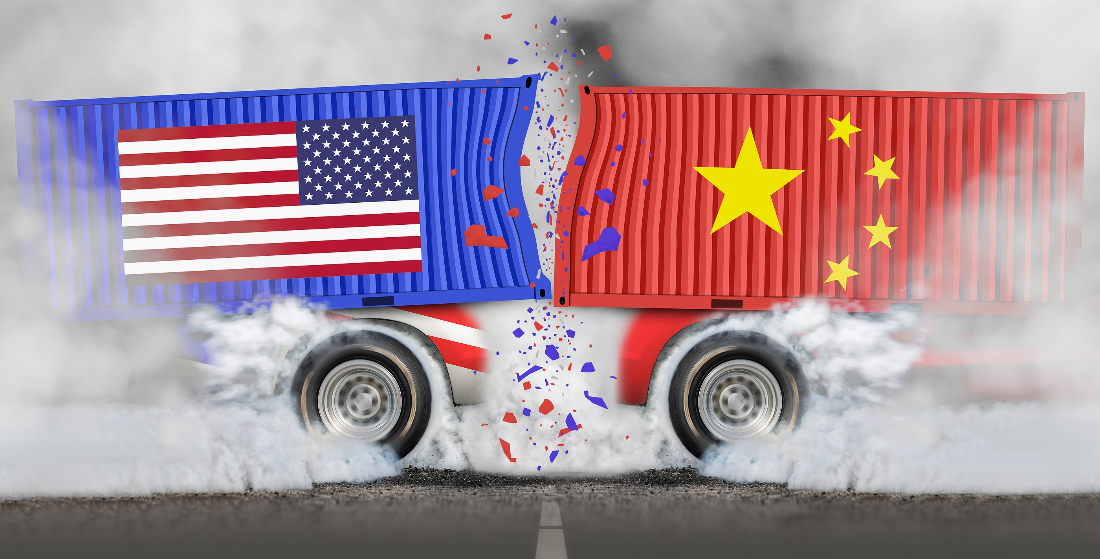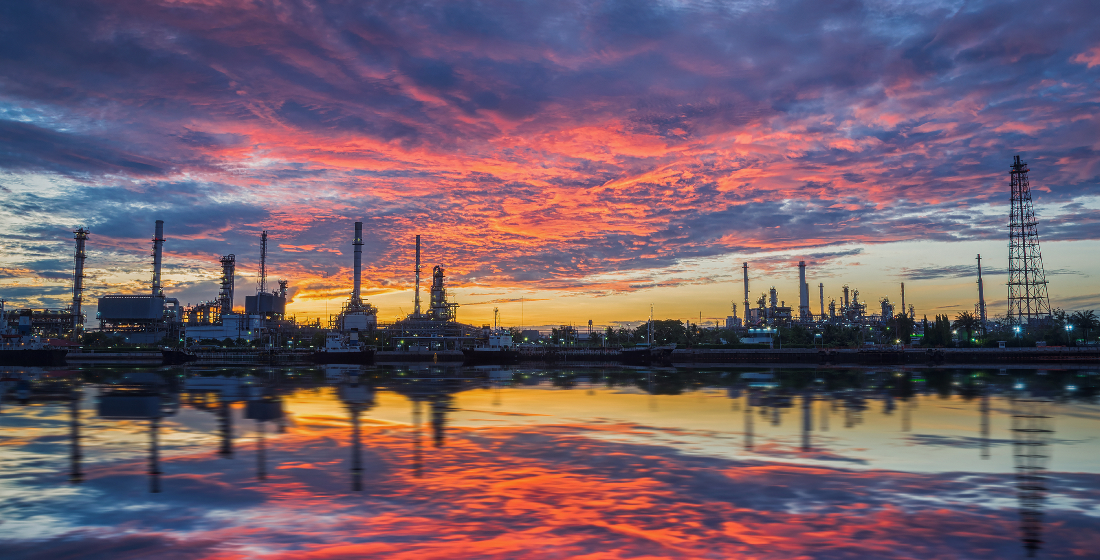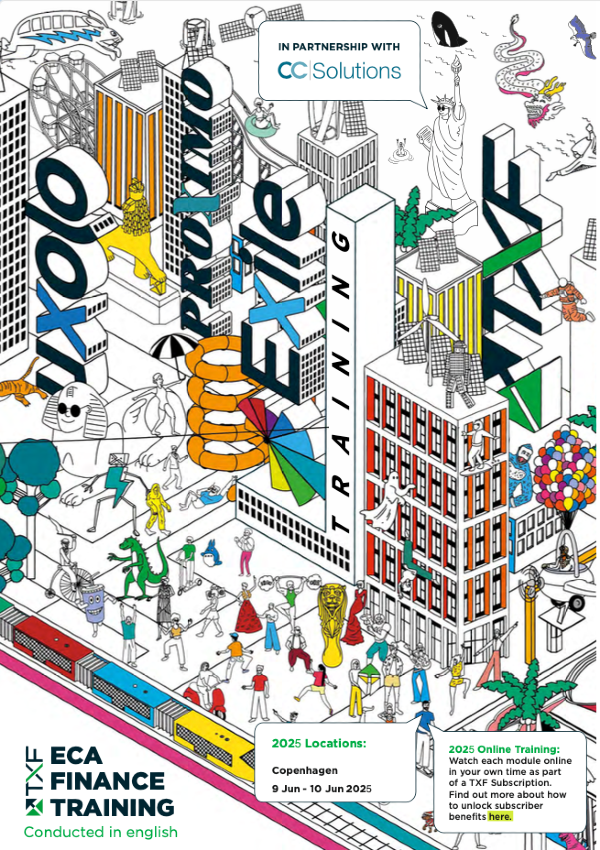US Exim has key role to play in China trade war
The US administration has drastically upped the ante in its economic war against China with its actions against Huawei. At the same time, US Exim is one agency that has been charged to not only promote US exports and jobs but also counter Chinese state financing where necessary. Jonathan Bell assesses the developments and implications.

Coming out of the Covid-19 nightmare one thing is sure and that is the export credit agencies (ECAs) will have a large role to play in the financing of exports, projects and providing investment cover. They did this post the global financial crisis, and their task is likely to be much more pressing and intense this time round.
And for the US Export-Import Bank (US Exim) which thankfully came back from its virtual moribund state when it was fully reauthorised on 20 December last year, and for a record seven years, there is much work to be done to rebuild relationships with overseas markets and actively support US exports and jobs. But one of the additional requirements for US Exim under its new mandate is to directly counter China’s two ECAs – Sinosure and China Exim.
This entirely fits in not only with President Trump administration’s geopolitical determination to directly confront China economically, but also now with a large part of the country’s elected political base. Anti-China sentiment has grown significantly through this year and the Covid-19 period in particular. As such, the widening of the trade war to unilaterally introduce sanctions on a company such as the leading Chinese telecoms Huawei drastically broadens the scope of the US economic confrontation with China (see below).
But for US Exim, even fully funded, and for that matter other ECAs globally, they still face an uphill struggle in competing against Chinese ECAs who not only have huge financial resources at their disposal, but also a big start in many markets – particularly within Africa - where China Inc has spent years developing its trade and investment foothold.
All eyes on China and the fantasy ‘level playing field’
How has China achieved this advantage? First it has been adventurous and pioneering, often going into markets where other global ECAs are off cover or simply fear to tread. Second, China has not been afraid to fly the China Inc flag by extending itself over longer terms and with cheaper debt. Third, it has tackled infrastructural projects delivering real benefits to many emerging markets – and these are often projects that other countries ECAs and DFIs haven’t even remotely considered or been interested in pursuing.
In short, China has extended itself immensely when most other countries have not, particularly in Africa. But there is always a price to pay – and many African countries are now trapped in a heavy debt burden cycle with China. And unlike some of the multilateral agencies which have recently written off debt with many lower income countries, China has not written off debt with its biggest African debtors – restructuring will be a more likely outcome. Some observers have categorised China’s trade and investment activities in Africa as a new form colonialism. Criticism is also levelled at China for not generating work/jobs for Africans or not providing enough training and transference of skills given the volume of projects generated.
From an ECA perspective, China’s agencies are also able to work to their own rules and guidelines. Many other ECAs are part of the OECD Consensus and for certain market activity they follow specific agreed guidelines. China is not part of this. Today, the Consensus is way out of date and needs revision – but this is no easy task as it involves all involved parties agreeing. This brings us round to the whole debate about the wider so-called ‘level playing field’. For my money, there never has been, nor will there ever be a true ‘level playing field’. Commerce is commerce and usually it’s a tough world out there.
Back in April 2016, at the annual US Exim meeting in Washington, when US Exim was in an awful state of limbo amid the discussion about its reathorisation, US Treasury was at pains to point out its view on the level playing field. US Treasury officials brought together many global export finance heads of leading commercial banks to discuss the way their respective ECAs were currently operating. Many of the ECAs they were referring to – particularly the European ones – had changed the way they operate introducing innovations to make them more relevant and competitive to changed global market conditions. The US Treasury’s view was broadly that as the US no longer had an effective ECA, then other countries should gear down some of their activities geared to supporting their exporters. You can imagine the response from the bankers in that meeting room. I will say no more!
So, roll on into late 2019 after several years of pathetic political wrangling within Congress and the Senate, and US Exim finally achieved the full reathorisation it deserved – and something that the US as a country desperately needed. And as part of that reauthorisation on 20 December 2019, US Exim was mandated to also introduce a ‘Program on China and Transformational Exports’.
This charged US Exim with a goal of reserving not less than 20% of the agency’s total financing authority (ie $27 billion out of a total of $135 billion) “to directly neutralise China’s export subsidies for competing Chinese goods and services.
The programme operates by supporting “the extension of loans, guarantees, and insurance, at rates and on terms and other conditions, to the extent practicable, that are fully competitive with rates, terms, and other conditions established by the People’s Republic of China or by other covered countries (as designated by the Secretary of the Treasury)”.
Since then US Exim has been actively working to establish the programme, which also includes: “advancing the comparative leadership of the United States with respect to China, and support US innovation, employment, and technological standards globally in ten transformational export industries, including 5G, artificial intelligence, renewable energy, and semiconductors”.
China Task Force keeps a close eye on activity
Then, earlier this month that key role of US Exim – countering China’s strong support for its export finance agencies – was reinforced in a meeting between US Exim with the House of Representatives (US Congress) China Task Force members.
At the 7 July meeting in Washington DC, US Exim president and chairman Kimberley Reed, said: “The US Congress has a critical mission when it comes to competition with China, and I appreciate the opportunity to underscore Exim’s unique and important role in keeping America strong – both through supporting US jobs and countering China’s opaque and exploitative practices — with the China Task Force.”
She added: “Economic security is national security, and, because of the new Congressional mandate for Exim to establish the Program on China and Transformational Exports, our agency is now positioned to advance America’s comparative leadership with respect to China and put American businesses and workers in a stronger position for generations to come.”
During the discussion, Chairman Reed highlighted key aspects of the just-released ‘Exim Report to the US Congress on Global Export Competition’. In particular, she underscored that China is using its two official export credit agencies, along with a number of other state entities such as state-owned banks and state-owned enterprises, to expand influence and gain competitive advantages. “This strategy necessitates a robust and integrated US government response, and Exim is a crucial element of statecraft in this regard,” it was reported.
The Exim Competitiveness Report shows that China provided $33.5 billion in official medium- and long-term (MLT) export credit—more than three times the amount of the next closest provider — in 2019. It was also stated that: “From 2015 to 2019, China’s official MLT export credit activity alone was at least equal to 90% of that provided by all G7 countries combined. And, beyond its two official ECAs, China uses several other official government entities to finance its exports and trade practices through a variety of means, including export credits. By a conservative estimate, China’s official export and trade-related financing totaled at least $76 billion in 2019. An exact figure is impossible to come by, given the opacity of Chinese official financing.”
China Task Force chairman Michael McCaul (R-Texas), stated: “I am grateful to president Reed for briefing members of the China Task Force on the Export-Import Bank’s multi-pronged efforts to combat the Chinese Communist Party’s (CCPs) predatory practices that put American workers and companies at a disadvantage. Briefings, like this one by president Reed and her team, are important to the task force as we form our wide-ranging legislative recommendations to best address the CCP’s global malign activities.”
Anthony Gonzalez (R-Ohio), China Task Force co-chair for economics and energy, also chipped in with: “I want to thank chairman Reed for her leadership at the Export-Import Bank and for taking the time to discuss with the China Task Force how we can better counter the Chinese Communist Party through the Bank [US Exim].”
He added: “The CCP represents one of the biggest existential threats facing our nation today, and as we begin to recalibrate our relationship, it is important that Congress provides the Export-Import Bank the ability to promote US companies in overseas markets to help bolster our economy and ensure continued US leadership on the world stage.”
As noted in the National Security Strategy of the United States, China challenges American power, influence, and interests, attempting to erode American security and prosperity. China’s infrastructure investments and trade strategies reinforce its geopolitical aspirations.
The changed scope of the trade/economic war between the US and China has been inevitable. Under phase 1 of the trade war the prolonged sanctions on products has certainly not produced the results that President Donald Trump had wanted, and in many cases it has done just the opposite. US consumers have largely carried the cost, and US farmers have lost out considerably despite being bailed out to a certain extent by Washington. Phase 2 is also a long way off the map, and Trump has very recently stated that he has no immediate intention of talking trade issues with Beijing. As such, other avenues of attack are being ramped up – one of which is the action against Chinese telecoms company Huawei. Only this week Trump has openly bragged about being personally responsible for some countries around the world severing ties with Huawei.
Huawei – the UK and the US triangle
Commercial relations between the UK and China hit a serious low on Tuesday this week when the UK government announced that Chinese telecoms company Huawei – the global leader in 5G technology - would be barred from taking part in the UK’s 5G programme by the end of this year. This is a complete U-turn from the January position where the UK government had said Huawei would be building 35% of the UK’s 5G programme. The UK government cited security issues and the fact that Huawei had been placed under severe sanctions by the US from using any US-produced parts and IP in its equipment.
What does this mean for the UK? Such a move will put any UK 5G roll-out some two to three years behind, and the banning of Huawei will mean additional costs of £2 billion ($2.5 billion) plus for the UK. These costs are likely to escalate as Huawei will also be required to strip out its technology and equipment from the existing 5G network by 2027, with its 3G and 4G products to follow. Beyond that, disruption to existing mobile and internet connections is widely predicted. On top of this China has threatened the UK with retaliation – China has invested in the UK heavily in the last 10 years and is even heavily involved in UK nuclear projects.
Many commentators have reported on the increased pressure that the UK has come under from the US to ditch Huawei. Others have commentated on the now enhanced security risk of moving forward with a telecoms company that is now no longer able to source components and IP from the US. And, as the anti-China rhetoric is stirred the numerous questions over serious human rights issues within China are also being voiced in mainstream media.
Should we be surprised? Probably not, given the increased intensity of the changed trade war between the US and China. And that changed trade war now seriously focuses on the challenge for global technological dominance and geopolitical power – with Huawei falling right in the firing line.
Now time to get up to speed with the markets
Here's a selection of original TXF Subscriber articles recently published
NLNG 7: A hybrid progression
Nigeria LNG's Train 7 hybrid debt raising is the first multi-sourced corporate financing for a project in the LNG sector. So how much of a progression is it beyond NLNG's other hybrid deal (the NLNG-Plus financing in 2003) and is it a feasible template for other established gas developers in emerging markets?
More Details on Capital Dynamics acquisition facility
More details have emerged on the acquisition financing (known as Kamloops) backing Capital Dynamics' purchase, via it’s Clean Energy Infrastructure platform, of a 353MW portfolio of 16 operating solar projects in the US from Coronal Energy.
Fujairah 3 CCGT closes JBIC-backed loan
Marubeni is said to have reached financial close on an ECA-backed facility backing the $1.1 billion 2.4GW Fujairah F3 CCGT project in the UAE.
Brazil's Tereos Group signs debut ESG-tied loan
Brazil’s Tereos Group via subsidiary Tereos Acucar & Energia Brasil signed a $105 million sustainability-linked export pre-payment financing on 4 June.
Meridiam wins Welsh schools MIM
Meridiam has been selected as the private sector delivery partner in a £500 million mutual investment model (MIM) concession that forms part of Band B of the Welsh government’s 21st Century Schools and Colleges Programme.
Kayne closes on Harts Mill PV financing
Kayne Renewable Opportunities Partners has closed on the financing backing the 112MW Harts Mill utility-scale solar PV project in North Carolina. Kayne acquired Harts Mill in December 2019.
Cameroon extends RFQ deadline for gas-fired plant
The RFQ deadline for prospective developers for the 350MW Limbe gas-fired power plant project in Cameroon has been extended to 10 August.
Windpark Pannonia Gols repowering loan signed
Sponsors of Windpark Pannonia Gols – 4P Envest GmbH (58%) and private investors (42%) – have closed on €113.6 million of debt to finance the onshore wind project’s €143.3 million repowering.
Eurofiber refinancing closed
Netherlands-based fibre network developer Eurofiber – which is owned by Antin Infrastructure Partners – has closed on a €848 million corporate refinancing.
Cocobod's annual revolver faces uptick in margin
Ghana Cocoa Board (Cocobod) is in the market to refinance its annual revolving credit facility.
Verizon adds to ECA-backed tally
Verizon Communications has closed on two ECA-backed deals for telecoms equipment totalling $2 billion.





